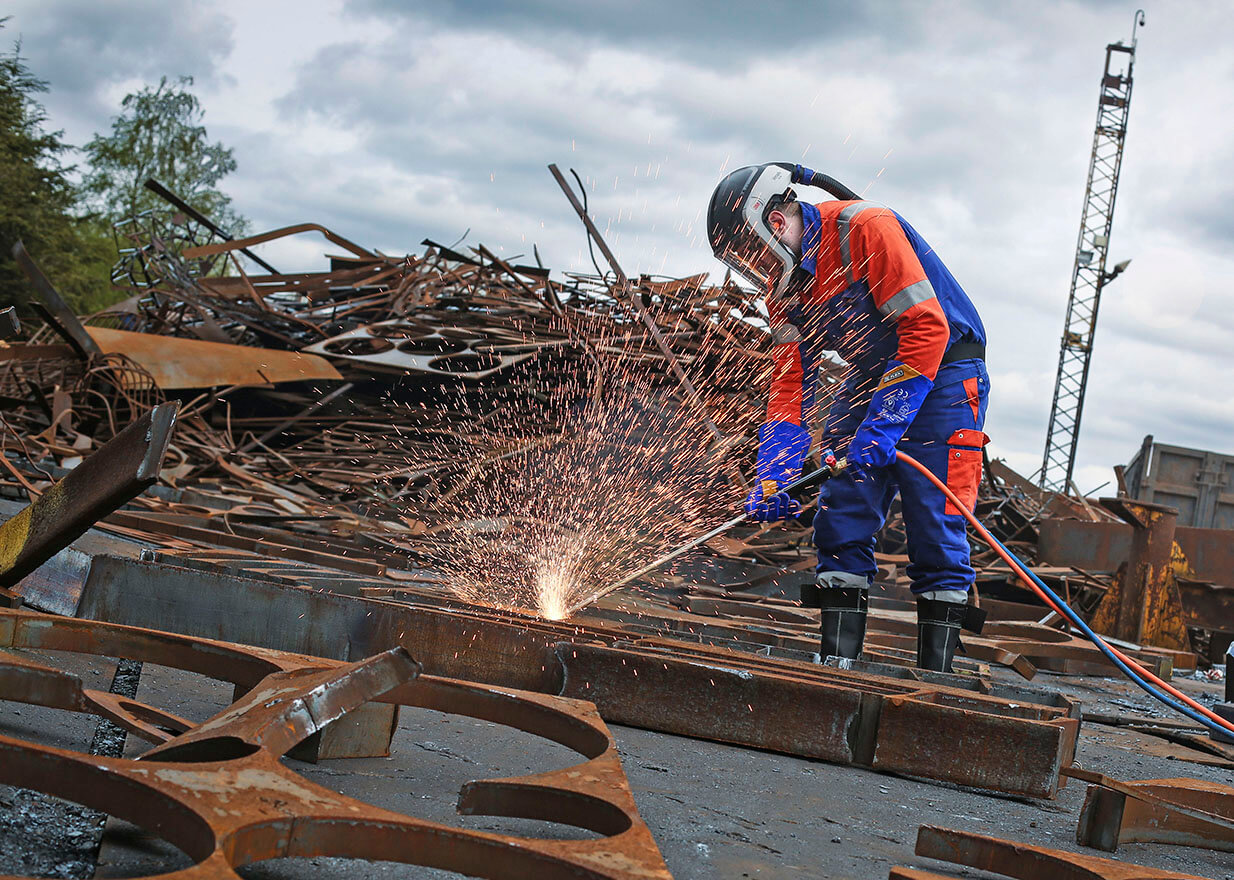CHOOSE
A DIFFERENT TERRITORY

When a member of the public decides to recycle their end-of-life vehicle, washing machine, dishwasher, fridge or other consumer product with EMR, the steel or iron (known as ferrous metal) it contains joins a circular economy that supplies the next generation of products, buildings and vehicles.
Consumer products aren’t the only sources of ferrous metal. EMR also collects and processes metal from demolition sites, decommissioned oil rigs and ships, as well as the offcuts from steelmakers themselves as they trim and resize metals in the manufacturing process.
Recycling ferrous metal as sustainably as possible means ensuring our operations are as efficient as possible. To achieve this outcome EMR must focus on two things: reducing the contaminants in ferrous materials - so that the steel works have a high purity product to melt - and increasing the density to ensure the maximum volume of material is loaded for each batch that is melted.
The biggest cost after the material itself – and one of the biggest contributors to carbon emissions - is transport, but how can our business ensure the maximum amount of material is delivered for recycling for every journey made and also meet the objectives of providing a clean dense product for the steel mills so they can be less reliant on the nature-depleting virgin iron ore?
One process is by shredding the ferrous metal, breaking it down into small pieces. This is particularly useful where an item is more complex and is made up of several different materials. Shredding allows EMR to recover plastics, non-ferrous and other materials from the steel via our sophisticated mechanical separation techniques.
The environmental benefits of producing cleaner, purer recycled steel mean that shredding and the separation of shredded steel is a major focus of investment for EMR. By expanding the supply chain for this high-quality recycled steel grade, with a more precise chemistry, our business can play a vital role in the creation of ‘green steel’. Green Steel is produced with much lower carbon emissions but can still perform to the high standards required for modern electric vehicles and appliances and in sustainable construction.
We are developing methods to separate elements such as copper that would otherwise contaminate the tight chemistry specification that are required in the finished steel grades. The copper and other metals that we separate from the steel can also be recycled for use in wiring or electronic devices. The same goes for the plastics that we recover from the shredding process.
In addition to shredding, EMR also processes metal via baling. This is where high-powered machines compress the material into tightly-packed cubes which, again, creates an efficient way of transporting the material to steel mills as well as allowing the steel mill to use more material in each melting cycle with the improved density of the material.
Finally, for larger pieces of metal – often from the demolition industry – there is shearing which can cut the material down to a more workable size. Metal mills usually have strict sizing requirements for any ferrous metal entering their foundries. Where metals are too thick to be cut by our shears, EMR teams can ‘burn’, or cut it, using a high-temperature torch cutter to create manageable pieces for processing.
Again, by delivering metals at the size required, EMR can ensure this important element of the circular supply chain runs smoothly and efficiently.
Once recycled steel leaves EMR it will be sent to steelmakers around the world. EMR maintains strong, long-term relationships with all of the businesses we work with, to ensure that the sustainability and safety of their operations matches our own high standards.
Historically, most steel has been made in a blast furnace via the BOS (Basic Oxygen Steelmaking) process. Increasingly however, steelmakers are using Electric Arc Furnaces, which can be operated with a high addition rate for recycled steel and without the direct use of fossil fuels. This process results in around a 70% carbon reduction. Most steelmakers are trying to increase the amount of recycled steel that they use and this requires recyclers like EMR to continuously improve the specifications of their products.
This is why EMR’s investment in creating purer, shredded steel is so important, not just for our business but also for the planet.
And it fits with EMR’s wider pledge to become a net-zero business by 2040, a commitment that is being tracked by some of the world’s most eminent climate scientists through the Science Based Targets Initiative. We’re already transitioning to 100 percent renewable energy and, wherever possible, EMR is replacing diesel-powered machinery with alternatives that can run on green electricity.
We know that people put their trust in recyclers like EMR whenever they bring end-of-life items to our depots. The investments our business is making at every stage of the recycling process means you can rest assured that EMR is both a responsible and sustainable choice, whether you are bringing us an old, broken washing machine or saying goodbye to a much-loved family car.